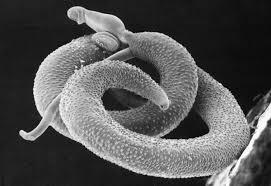Dr. Meta Roestenberg, an infectious disease specialist at the Leiden University Medical Center in the Netherlands is focused on schistosomiasis, a disease that affected over 200 million people in 2016, especially in Africa, the Middle East and Latin America. The disease is caused by tiny parasites, worms of the genus Schistosoma. Hosts for the worm are aquatic snails which, when conditions are right, spew the larval form of the worm into the surrounding water.
When a human enters infested waters, the larvae burrow through the skin, live in blood vessels and can invade various organs and reproduce. Eggs are excreted by the infected person, hatch into an intermediate stage which then invades the snails, as depicted below.

Source: CDC.gov
Thus far there is only one drug to treat the resulting infection — praziquantel. Dr. Roestenberg and her colleagues want to add to this armamentarium — perhaps with a vaccine against the parasite. To do this requires research on infected individuals, and they are relying on volunteers who have been recruited to help with the research by allowing themselves to be intentionally infected with the parasite for the sake of scientific advancement (and also for the € 1,000 they will earn).
The worms are raised in the lab, usually using hamsters as a host instead of humans. Then the eggs the rodents excrete are allowed to hatch and enter snails — and then the larvae — 20 for each volunteer — will be placed on the person's arm and allowed to burrow in. Every week for 12 weeks the volunteers will return to the lab to have their blood drawn and tested for a molecule called CAA which the worms produce. Once CAA is present, the researchers know the worms are alive — and they will know if their model infection will be useful for testing candidate vaccines, which is the ultimate goal.
Dr. Roestenberg is giving the volunteers only male larvae and thus there will be no eggs nor risk of the worms multiplying. At the end of the 12 week period, the volunteers will be given praziquantel to rid them of the parasites.
Although we're used to hearing about studies in which people are given candidate drugs, which may or may not be safe or effective, this purposeful infection of healthy people with parasites seems to be a different type of experimental paradigm. In the former case, one might volunteer for such a study because they have a disease or condition the drug is intended to treat. In the case of the worms, these people in the Netherlands would likely never encounter these parasites. So is it really ethical, or does it contradict the principle of "do no harm"?




